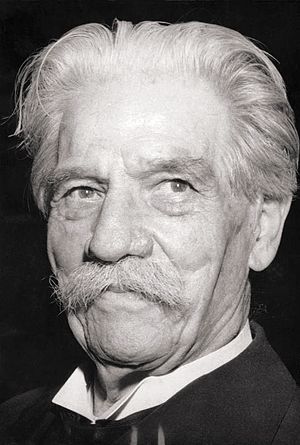
Its not enough merely to exist. Every man has to seek in his own way to make his own self more noble and to relize his own true worth.
Share this quote:
Man is a clever animal who behaves like an imbecile.
Share this quote:
Man must cease attributing his problems to his environment, and learn again to exercise his will - his personal responsibility in the realm of faith and morals.
Share this quote:
I dont know what your destiny will be, but one thing I know: the only ones among you who will be really happy are those who have sought and found how to serve.
Share this quote:
Das Glück ist das einzige, das sich verdoppelt, wenn man es teilt.
Share this quote:
He who does not reflect his life back to God in gratitude does not know himself.
Share this quote:
There are only three ways to teach a child. The first is by example, the second is by example, the third is by example.
Share this quote:
O heavenly Father,protect and bless all thingsthat have breath: guard themfrom all evil and let them sleep in peace.
Share this quote:
Happiness is nothing more than good health and a bad memory.
Share this quote:
Example is not the main thing in influencing others. It is the only thing.
Share this quote:
Until he extends the circle of his compassion to all living things, man will not himself find peace.
Share this quote:
Whoever is spared personal pain must feel himself called to help in diminishing the pain of others. We must all carry our share of the misery which lies upon the world.
Share this quote:
Joy, sorrow, tears, lamentation, laughter -- to all these music gives voice, but in such a way that we are transported from the world of unrest to a world of peace, and see reality in a new way, as if we were sitting by a mountain lake and contemplating hills and woods and clouds in the tranquil and fathomless water.
Share this quote:
The Jesus of Nazareth who came forward publicly as the Messiah...and died to give his work its final consecration never existed. [Modern Christian Thought: The twentieth century, Volume 2 by James C. Livingston, Francis Schüssler Fiorenza, p.13]
Share this quote:
We must fight against the spirit of unconscious cruelty with which we treat the animals. Animals suffer as much as we do. True humanity does not allow us to impose such sufferings on them. It is our duty to make the whole world recognize it. Until we extend our circle of compassion to all living things, humanity will not find peace.
Share this quote:
For animals that are overworked, underfed, and cruelly treated; for all wistful creatures in captivity that beat their wings against bars; for any that are hunted or lost or deserted or frightened or hungry; for all that must be put to death...and for those who deal with them we ask a heart of compassion and gentle hands and kindly words.
Share this quote:
The fundamental principle of morality which we seek as a necessity for thought is not, however, a matter only of arranging and deepening current views of good and evil, but also of expanding and extending these. A man is really ethical only when he obeys the constraint laid on him to help all life which he is able to succour, and when he goes out of his way to avoid injuring anything living. He does not ask how far this or that life deserves sympathy as valuable in itself, nor how far it is capable of feeling. To him life as such is sacred. He shatters no ice crystal that sparkles in the sun, tears no leaf from its tree, breaks off no flower, and is careful not to crush any insect as he walks. If he works by lamplight on a summer evening, he prefers to keep the window shut and to breathe stifling air, rather than to see insect after insect fall on his table with singed and sinking wings.
Share this quote:
Compassion, in which all ethics must take root, can only attain its full breadth and depth if it embraces all living creatures and does not limit itself to mankind.
Share this quote:
Think occasionally of the suffering of which you spare yourself the sight.
Share this quote:
The doctor of the future will be oneself.
Share this quote: